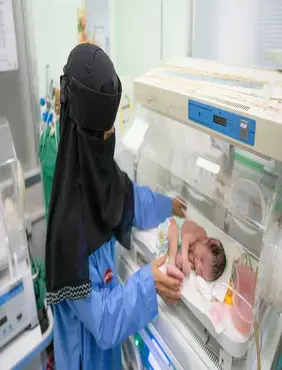Yemen remains the site of one of the world’s largest humanitarian crises. A staggering 23.4 million people — 73 per cent of the population — require some form of humanitarian assistance in 2022. Millions have been uprooted from their homes, the economy has collapsed and nearly the entire health system has cratered, allowing preventable diseases, such as cholera and COVID-19, to spread unchecked.
Women and girls are among the hardest hit. An estimated 77 per cent of the 4.3 million people displaced in Yemen are women and children. An estimated 8.1 million women and girls of childbearing age require help accessing reproductive health services. Among them are 1.3 million women who will deliver in 2022, of whom 195,000 are projected to develop complications, requiring medical assistance to save their lives and that of their newborns. In addition, an estimated 6.5 million women and girls will require services to prevent and address gender-based violence in 2022. However, such services remain overstretched across Yemen, and completely absent in some hard-to-reach areas.
Amid growing humanitarian needs, the aid operation in Yemen remains severely underfunded. By the end of June, the 2022 Yemen Humanitarian Response Plan received only 26 per cent of the requested US$4.27 billion to provide lifesaving assistance and protection services to 17.9 million people, forcing aid organizations to reduce or close critical assistance programmes.
Since the beginning of the year, lack of funding has forced UNFPA to scale back lifesaving reproductive health and protection interventions across the country by 25 per cent, with maternal and newborn deaths recorded in health facilities where support has been suspended. To keep reaching the most vulnerable women and girls, UNFPA requires US$100 million in 2022. To date, only 20 percent of this funding appeal has been received.
From January to June 2022, UNFPA's response reached 1.3 million individuals with life-saving reproductive health services, protection information and services and emergency relief, with support to 99 health facilities, 35 safe spaces, seven shelters and eight specialized mental health centres.


